Pregnancy by weeks
Pregnancy is undoubtedly one of the most beautiful periods in a woman's life. Of course, it brings with it a lot of changes that the female body has to cope with. How a new life is born is a miracle in itself, but many mothers-to-be are interested in how pregnancy goes week by week, what changes await them, what they have to watch out for, but most importantly how the baby itself develops in the belly. How many weeks does pregnancy last? By default, pregnancy lasts 40 weeks (10 lunar months) and is divided into three trimesters. This column offers a clear and detailed view of the gradual development of pregnancy from its beginning to the full 40 weeks and birth. Here you will find everything from changes in the mother's body to the appearance of pregnancy symptoms to the development of the fetus after weeks. You will learn how a fertilized egg and millions of cells become your desired baby. If you are already pregnant or just planning to become pregnant, you can see what will happen to your body and baby in this section.
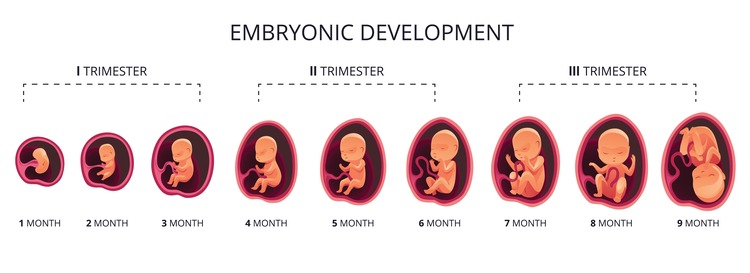
First trimester of pregnancy (weeks 1-13)
You may be surprised that the first weeks of pregnancy, the 2nd-3rd week, the woman is not actually pregnant yet. In the first weeks, everything will revolve around ovulation, fertilization and implantation of the fertilized egg in the uterus. Only then can we start talking about the beginning of pregnancy. Gradually, the first symptoms of pregnancy begin to appear. In some women, the symptoms of pregnancy are stronger in the beginning, in others they are weaker. Hormonal activity changes, especially the level of the hormone hCG (human chorionic gonadotropin), which is tested in very early pregnancy tests. Hormones also significantly affect a woman's psyche.
In the first weeks, basic organs and systems are formed. In the 6th week of pregnancy, ultrasound can detect the heartbeat, in the 8th week of pregnancy, even the first movements of the embryo. The woman does not feel them yet. In the first trimester, a pregnant woman usually registers for her first prenatal visit with a doctor or obstetrician. During this visit, various tests will be performed, including blood tests to determine the level of the hormone hCG and other markers of pregnancy. The woman will also learn the estimated date of birth. Changes on the body are not yet so visible. The first trimester of pregnancy is a crucial period for the healthy development of the fetus. These are also the most risky weeks of pregnancy.
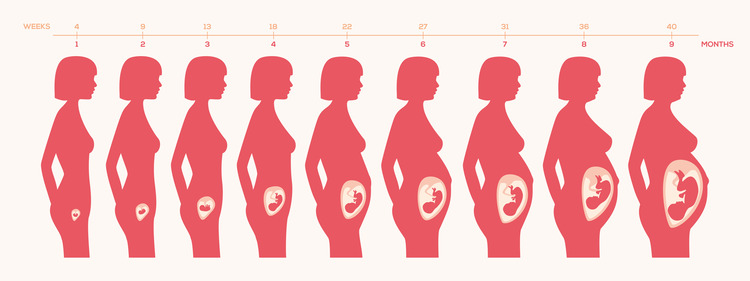
Second trimester of pregnancy (14-26 weeks)
After a challenging first trimester, pregnant women may begin to feel more energetic and less nauseous. For many women, first-trimester morning sickness eases or disappears entirely. As the weeks of pregnancy increase, the belly begins to grow, and thus a clear visual sign of pregnancy appears. The size of the belly in the second trimester is not yet so big that it restricts the woman. The woman begins to gain more weight. In the second trimester, many women begin to feel the first movements of the baby. Most often around the 20th-22nd week of pregnancy. During the second trimester, detailed ultrasound examinations can be performed - 3D ultrasound or even 4D ultrasound.
In some cases, other prenatal tests, such as an amniocentesis or screening for gestational diabetes, may be performed in the second trimester. There is significant growth in the length and weight of the fetus, further development of organs and systems occurs. Organs such as the heart, lungs, kidneys and liver are still being perfected and undergo major developmental changes. The fetus's nervous system and senses, such as sight, hearing and touch, are also developing. The fetus begins to train its breathing by absorbing and excreting amniotic fluid.
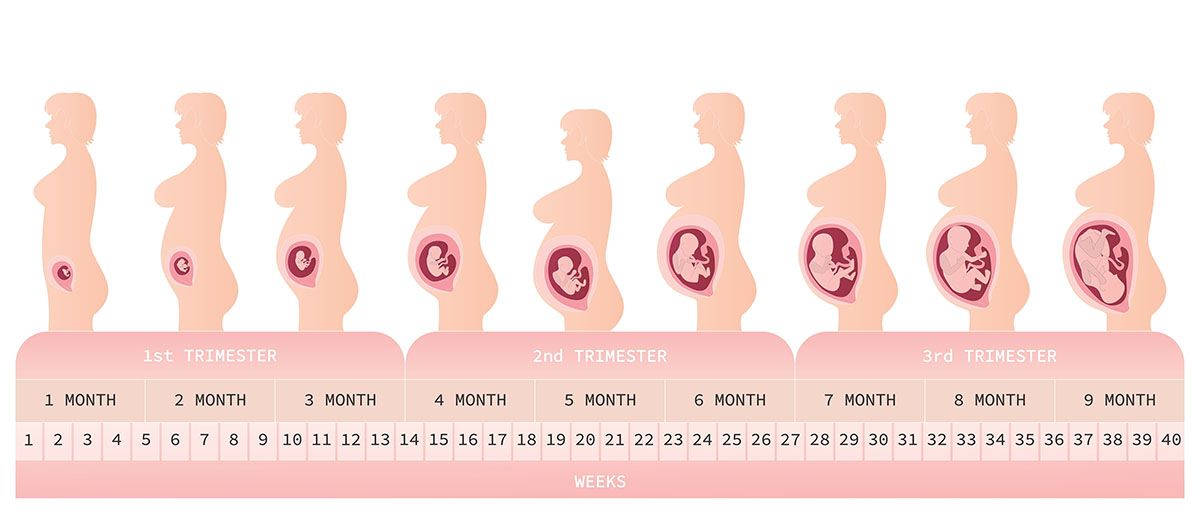
Third trimester of pregnancy (27-40 weeks)
The period from the 28th to the 40th week of pregnancy and includes the last weeks before birth. It is a time of great changes and preparation for the arrival of a new family member. The pregnant belly of the mother continues to grow and can be quite large. The growing fetus pushes out the mother's organs and can cause discomfort. During this period, the uterus begins to contract at regular intervals, which are Braxton-Hicks contractions. These are false contractions that prepare the birth canal for birth. They can appear already during the 2nd trimester. Weight gain related to fetal size continues. In the third trimester, it is important to start active preparations for childbirth. The mother should choose a birthing clinic, an obstetrician and familiarize herself with the options for childbirth. Prenatal preparation, breathing training is ideal, and even light exercise during pregnancy will not hurt.
In the last weeks of the third trimester, the mother may feel that she is ready to give birth. He must also take into account the deviation of the expected date of birth, plus or minus two weeks. Also take into account that the length of pregnancy can be extended - post-term pregnancy. The fetus is still growing, but its growth is not as fast as in previous trimesters. Because of the limited space in the uterus, the movements are usually less intense and irregular. In the third trimester, the fetus develops and perfects its lungs. The fetus can respond to external sounds, including the mother's voice and other sounds. His eyes are still developing and he can react to light by moving around in the womb. In the last weeks of the third trimester, the fetus prepares for birth and begins to change its position - turn.
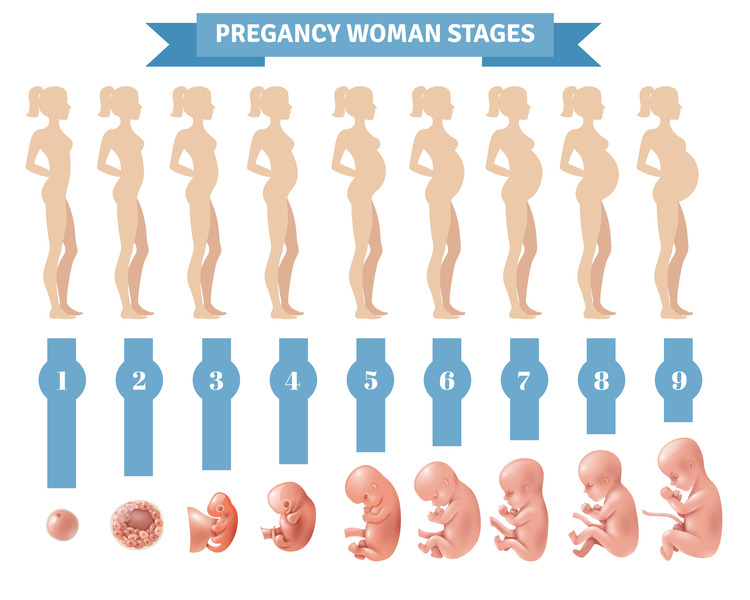

15th week of pregnancy – pain in the lower abdomen, ultrasound and belly. Which month is it?

14th week of pregnancy – pain in the lower abdomen, movements, belly and ultrasound
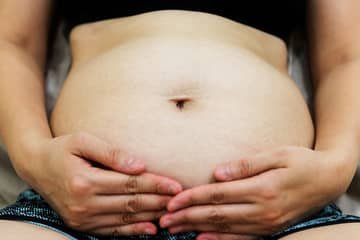
13th week of pregnancy - gender, risks, ultrasound and fetal size
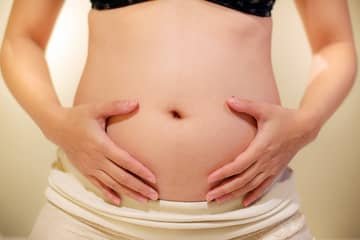
12th week of pregnancy - what month is it? Fetal size, ultrasound and baby gender

11th week of pregnancy – belly size, movements and pain in the lower abdomen. Which month is it?
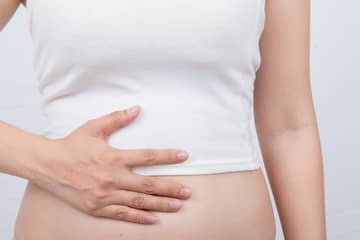
10th week of pregnancy - size of the fetus, symptoms, size of the belly and pain in the lower abdomen

9th week of pregnancy - symptoms, belly size, ultrasound and fetal size
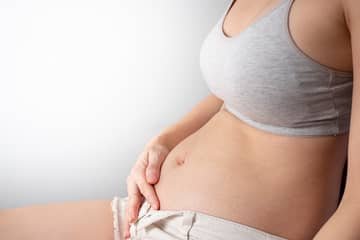
8th week of pregnancy - fetal size, belly, symptoms. Am I expecting twins?
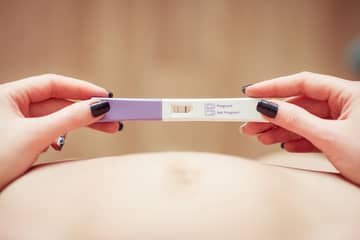
7th week of pregnancy - symptoms, pain in the lower abdomen, size of the fetus. Which month is it?
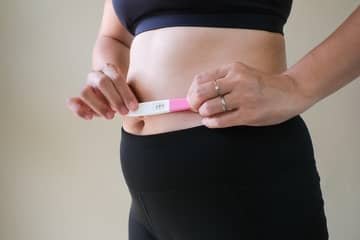
6th week of pregnancy - pain in the lower abdomen, symptoms, belly. Time for an ultrasound?

5th week of pregnancy – ultrasound, belly, pain in the lower abdomen and the size of the fetus

4th week of pregnancy - symptoms, ultrasound, pain in the lower abdomen, hCG

3rd week of pregnancy - symptoms, pain in the lower abdomen and the size of the fetus

2nd week of pregnancy - symptoms, belly, size of fetus. Go for an ultrasound?
